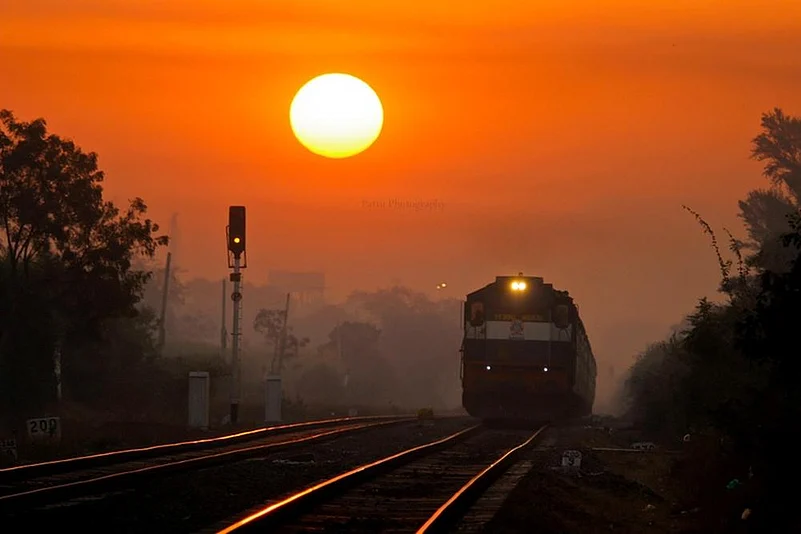Long trips on rail-tracks can chug out tales; for, the travellers are anyway samples of society. The stories can either be peopling those from varied socio-economic classes or be of a largely homogenous group or even a tasteful compilation of vignettes along the way. Whichever, (late) Gangadhar Gadgil had been a master of such narratives, the English version of which features the latest in A Faceless Evening.
The title is that of a fascinating story which comes as a centrepiece in the 201-page work brought out by Delhi-based Ratna Books. Translated into English by teacher-editor Keerti Ramachandra, the book begins with a train story focusing a couple who spends a hot day in an otherwise lonely coach where they happen to play out an intense chapter from their lives. Of a present-time friction, where incidents occasionally reel back to a not-so-distant past and, eventually, gives a cryptic hint at the future.
Advertisement

The man and the woman have passed their prime; so have their relation. Both met in the corridors of film industry, where romantic ties often bloom with an eye on quicker career advancement. The woman believes her partner has of late treated her as spent force now since her era of stardom is over. The man, a writer, isn’t guilty about it—he’s even practical, thereby suggesting ways to settle the dispute.
The drama unfolds in heightened heat along the sprawling Maharashtra landscape across which the train carrying them moves in the day time. As evening eventually sets in, some drinks they manage to buy appear to cool their tempers. Overlapping with this is the onset of torrential showers that wet the parched soil—as if symbolising what happens to the duo in the train. Nothing is particularly left to high optimism, making the train itself appear a mad soul pacing in the darkness of a rainy night.
Advertisement
Mumbai-born Gadgil (1923-2008) seems to have had a particular fascination to write train tales, more so when the season during the journey is summer. A self-translated story of his retains the quintessential quality of following the minutest of human interactions even as it entertains more characters and, in this case, belonging to two social classes. Heat spreads as a mood-setter in The Wan Moon, where again the daytime events unfold inside a second-class compartment—this time crowded.
Just like in Thirst, here too (in Contemporary Indian Short Stories brought out by Sahitya Akademi) the introductory notes are spent on how the glowing sun virtually wilts not just the travellers but the whole landscape outside the train. Very close to how it is in Thirst, wry humour prevails across the narrative of The Wan Moon, definitely in deeper intensity. It’s primarily about a labour-class family—a couple with their three children including an infant—travelling when “the sun beat down upon them through the windows” while “gusts of hot wind brought in clouds of dust”. The household’s head, dominant in his little ways, misses no opportunity to snub his wife in front of their little children.

Into the middle of the trip, when the train stops at a station, enters a woman of the same age of the mother of three. The new character, “elegant”, walks up to them and “rather curtly” asks the man to make room for her. That triggers a chain of interactions between the three adults—varied and often changing course, much to the amusement of the reader. Towards the end, a young man joins the “elegant” woman, and together they occupy two seats near the window. Their pleasant chatter makes the other woman realise that “this was what she had unknowingly longed for always in the midst of the drudgery that was her life”. As the train speeds on well beyond the twilight hour, the sky sports a waxing moon that the young couple find beautiful. The mother of three wants on someone’s arm to watch the moon, but her husband is far removed in a world that has no such sentiments.
Advertisement
Contrasting these two stories is The Beckoning Stars, where the storyteller prefers to be an observer in a summer-time journey where he changes train too. Published as part of The Throttled Street And Other Stories, it typically takes a microscopic view of random sights outside the coach where the narrator sits. “The fan whirled noisily over my head, but it hardly stirred any air,” goes the account in first person, ending with the details of a woman bidding goodbye to her husband—their character looking completely different for the storyteller from the conduct of the exercise. Enchanting in ways, but not before making a general comment about the passengers: “I somehow thought they were holding up the train with those tiresome, interminable farewells.”
Advertisement

Back to The Faceless Evening (14 stories, Rs 299), the story by that title is about a sultry sundown hour in busy Mumbai. And, if Thirst has its summer day end with rains, the following story (Bandu and his Umbrellas) is hilarious and—as if in sequence—set in monsoon-time Mumbai.




















